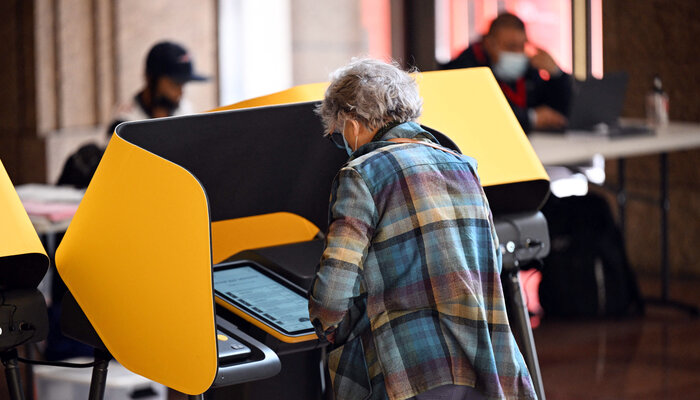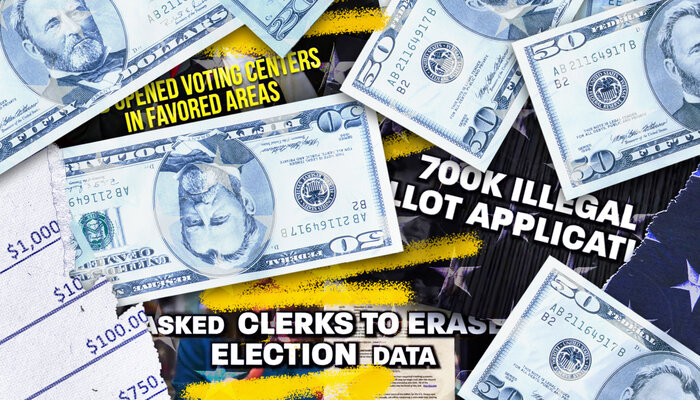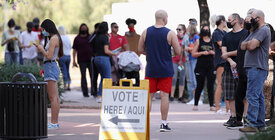The issue of election denial — the false claim that the 2020 election was “stolen” from Donald Trump — has remained central to the political debate throughout the midterms race. In several battleground states that could be pivotal in the 2024 presidential election, election deniers are on the ballot for positions that will play key roles in administering that contest.
The most important races to watch for election denial are secretary of state contests in Arizona, Michigan, Minnesota, Nevada, and Wisconsin. Notably, despite boasting a fundraising advantage during the primaries season, election deniers in these races have been overwhelmingly outraised by their opponents — even with the millions of dollars that a handful of megadonors have poured into their campaigns. And they may be trailing behind in fundraising, but election denying secretary of state candidates are ramping up the spread of false fraud narratives across social media platforms in the lead-up to Election Day.
Election deniers on the ballot
There are four battleground states with election deniers running for secretary of state: Arizona’s Mark Finchem (R), Michigan’s Kristina Karamo (R), Minnesota’s Kim Crockett (R), and Nevada’s Jim Marchant (R). For reasons explained below, Wisconsin’s secretary of state contest is also an important one to watch.
Gubernatorial races in seven battleground states also have election deniers facing voters this month: Arizona’s Kari Lake (R), Florida’s Ron DeSantis (R), Michigan’s Tudor Dixon (R), Minnesota’s Scott Jensen (R), Nevada’s Joe Lombardo (R), Pennsylvania’s Doug Mastriano (R), and Wisconsin’s Tim Michels (R).
Why secretary of state races matter
Running elections requires an understanding of complex administrative procedures, the strengths and weaknesses of various technologies, what employees and volunteers are capable of, and how each of those things affects voting and vote counting. Election denial depends on believing or spreading falsehoods about all those components of the voting process. That misinformation, if not corrected, could reduce voter confidence or even call into question the result of the next election.
The powers of secretaries of state vary based on state law, but many can issue rules that govern election procedures, such as purging voters from the rolls, early voting, and certifying results. In Arizona, the secretary of state can decertify voting equipment and prevent it from being used. The Nevada secretary of state writes rules establishing the standard for counting ballots.
In Wisconsin, the secretary of state does not administer elections; that authority is exercised by the bipartisan Wisconsin Elections Commission. But since 2020, politicians and candidates have attacked the commission with election denial narratives. Many have pushed to eliminate it and give the secretary of state greater power over elections, including the election denier candidate for governor, Tim Michels. Secretary of state candidate Amy Loudenbeck (R) has also criticized the commission’s performance in 2020 and endorsed giving the secretary of state more power over elections.
The financing of secretary of state races
Once sleepy, bureaucratic affairs, secretary of state races are suddenly attracting attention from partisans in their state and across the nation. Across six battleground states with secretary of state elections this year, fundraising by candidates through September totaled $26.4 million, more than double the $11.8 million raised at that point in 2018. Candidates are raising more money from donors outside their states, and national outside groups like super PACs are making multimillion-dollar ad buys in several states.
Across the four races with an election denier on the general election ballot for secretary of state, election deniers are being outraised by a ratio of three to one. This contrasts with earlier in the election cycle, when several election deniers’ primary campaigns led fundraising.
A handful of megadonors are supporting election deniers in multiple states, some with multimillion-dollar super PAC donations. These donors have ties to efforts to challenge the 2020 election, including the partisan ballot review in Maricopa County, Arizona, and the January 6 insurrection. For example, packing supplies magnates Richard and Elizabeth Uihlein have given $58 million to boost state election denial candidates, including in secretary of state races. However, the bulk of the Uihleins’ spending — $54 million — went to support Republican Darren Bailey’s campaign for Illinois governor. Another notable megadonor is former Overstock CEO Patrick Byrne, who claims to have spent $20 million on efforts to challenge the result of the 2020 election and has given more than $300,000 in support of election denial candidates across several states.
Election denial is ramping up as Election Day approaches
Analysis of social media data shows that fraud is a common topic for posts by state candidates, and it drives engagement. More than 31 percent of secretary of state candidates’ posts on Facebook perpetuate a false election narrative. And on Twitter, false narratives from candidates dramatically increased between August and September. The vast majority of these falsehoods were posted by election deniers.








